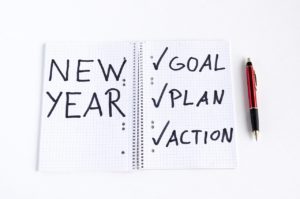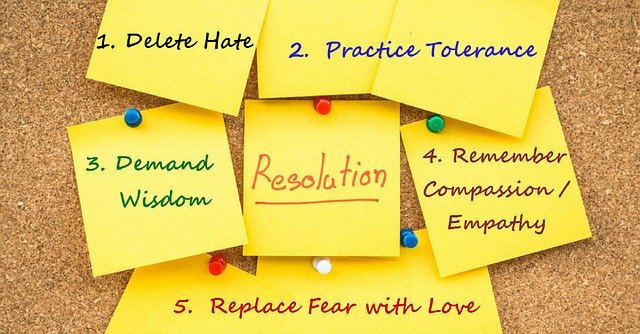It’s almost 2020, the beginning of a new year and a new decade. New beginnings can be refreshing, they instill hope for the future and give us a chance to dream about what is possible. Think about various new beginnings you’ve had, moving to a new place, starting a new job, starting a new relationship. I’m sure they gave you a chance to start afresh. This is why new year’s resolutions are popular in January. The new year offers an opportunity to start over, to reset, to try again.
But, why don’t most people accomplish their new year’s resolutions by the end of the year? It seems as if as the year goes on, we get back into our regular routine and forget what we were hoping to change.
The tips below will help you decide on what you really want and stick to accomplishing your desires in 2020.
Be more specific
The problem with new year’s resolutions is the whole notion of a resolution. What is it? The Oxford dictionary defines resolution as “a firm decision to do or not to do something.” Great! It takes a about 21 days for the brain and body to change so we develop a habit, but we think making a resolution will change something automatically? Not likely. The reason why people make those resolutions and only stick with them till the end of January (if even) is because making a resolution is not enough. You need goals and a plan.
A better way to approach the changes you want to make for the new year is to make new year’s goals. According to the Oxford dictionary, the literary meaning of a goal is “a point marking the end of a race.” It is defined as “the object of a person’s ambition or effort; an aim or desired result.” Goals focus on the end result, giving you a specific end point you want to accomplish. Do you see the difference between a resolution and a goal? Accomplishing your desired outcome begins with setting yourself up for success. So here is how you should approach resolutions this year:

- Start with your resolution – For example: Reduce stress in 2020
- Create goals – There are multiple resources out there that can help you come up with SMART (specific, measurable, attainable, relevant, and time-based) goals. I won’t go over that in this post but below are examples of goals using the resolution to reduce stress in 2020. The three most basic aspects to reduce stress are sleep, food, and exercise, therefore small goals to accomplish this include…
- Get 8 hours of sleep every night
- Eat at least three healthy meals daily
- Exercise for at least 30 minutes three times (or more) a week
- Monitor my mental health through at least 15 minutes of daily reflection
- Make a plan – This is where you make a plan for how you will accomplish your goals. Using the example to reduce stress, how will you restructure your day so you can get the 8 hours of sleep, eat the healthy meals, exercise for 30 minutes, and have reflection time? This may imply prioritizing and giving up things that are not beneficial to you accomplishing your goals. Think about what you need to give up to make your plan work. When would you need to go to bed? When would you prepare your food and what form of exercise would you do?
- Take action – Don’t just plan. Do it!
- Review frequently (e.g. monthly or every 3 months) – This helps you assess where you are, direct you on what to keep doing and what to change so you can successfully accomplish your goals.
Know what you want first
In order to do any of the above recommendations right, it is important to know what you want and when I say you, I mean YOU! Not your parents, not your family, not your community, YOU. What do you want? Sometimes we get so wrapped up in what other people want for us that we don’t really ask ourselves if the things that other people want is what we want for ourselves. This can be especially common for people from collectivistic cultures such as Africans. When families want us to be married, to make more money, to buy a house, to pursue a particular career path, etc, it can be distracting to have all these other voices while trying to listen to our own voice.
As someone from African descent, you might have a combination of your own desires and your family’s desires for you. That’s okay as long as you recognize your wants and are not just grudgingly going along with other people’s wants.
A good way to approach knowing what you want is to take stock of your past year or better yet the past 5 years. How do you do this?
- Pick out a date and block out some time, let’s start with 2 hours
- Go somewhere quiet, in your house, to a coffee shop, to a library, a place of your choice
- Spend the time assessing how things have been for you. If you are someone who journals or does new year’s resolutions or goals, pull them out and read what you wrote down for the past few years. If you are not someone who usually writes, reflect on things maybe based on your last year’s calendar or from memory. Answer the questions below and others that come to mind:
- What are you proud of accomplishing? What went well?
- What things did you find yourself doing naturally that you got praised for and/or you felt good doing? – This is usually a hint at what you want to be doing more of!
- What didn’t go to well? Where did you see little or no progress? Are there any of these things that you need to improve on? Or do you need to let them go and stop trying? Are they showing you that you don’t need to be doing this anymore or are they showing you that you need more training in something?
- Do you notice any repeated theme? Anything that has been nudging at you for the past few years? It could be a hope or a desire or a dream. – This is usually a hint at what you really want!
- Is something jumping at you? Now, answer the question, what do you want? Remember to DREAM BIG!!!
- Write out what you want (or do a vision board) and post it somewhere visible where you can see it daily throughout the year. This step is the part that many people miss but is one of the most important because it reminds you of what you are working toward. Without this part, it is easy to forget and give up.
Once you have it clear what you want, go back to the first part of this post and write out the goals you will need to accomplish what you want and write out a plan for how you will do it. Then, it is time to take action! Remember that it takes about 21 days to develop a habit and by that I mean it could take much longer. So, if you don’t succeed during the month of January, keep at it, don’t give up. Nothing truly worth having comes easy, it takes hard work so persevere through and your goals will come to fruition.




3 Responses